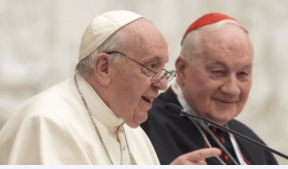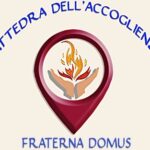Pope Francis’ address to the international conference “MAN-WOMAN, IMAGE OF GOD”
for The Centre for Research and anthropology of vocations – CRAV)”
Synod Hall – Friday, 1 March 2024
Cardinal Ouellet, the prefect of the Congragation for Bishops, with the support of a wide international scientific committee, set up in november 2020 the Center for Research and Anthropology of Vocations, which is attached to the Holy See.
Pope Francis’ words before the address
I ask to read, so that I don’t get so tired; I still have a cold and it makes me tired to read for a while.
But I would like to emphasize one thing: it is very important that this meeting takes place, this meeting between men and women, because the greatest danger today is the gender ideology that erases differences. I have asked for studies to be carried out on this ugly ideology of our time, which erases differences and makes everyone the same;
To erase difference is to erase humanity. Man and woman, on the other hand, are in a fruitful “tension”.
I remember reading an early twentieth century novel ‘Lord of the World’, written by Rev. Robert Hugh Benson, the son of the Archbishop of Canterbury. The novel is about the futuristic and it is prophetic, because it shows this tendency to erase all differences (between men and women.
It’s interesting to read it, if you have the time, because there are these problems of today;
That man was a prophet.
Brothers and sisters!
I am happy to take part in this conference promoted by the Centre for Research and Anthropology of Vocations, during which scholars from different parts of the world, each with his or her own expertise, will discuss the theme “Man-woman, image of God. For an Anthropology of Vocations.“
I greet all the participants and thank Cardinal Ouellet for his words: we are not yet saints, but we hope to remain always on the way to becoming one, this is the first vocation we have received!
And thank you above all because, a few years ago, together with other authoritative people and in search of an alliance between knowledge, you gave life to this Center, in order to launch an international academic research aimed at understanding better and better the meaning and importance of vocations, in the Church and in society.
The purpose of this Conference is, first of all, to reflect on and appreciate the anthropological dimension of every vocation.
This reminds us of an elementary and fundamental truth, that we need to rediscover today in all its beauty: human life is a vocation.
Let us not forget that the anthropological dimension, which underlines every vocation in the context of the community, has to do with an essential characteristic of the human person as such: namely, that man himself is a vocation.
Each one of us, both in the great choices that concern a state of life, and in the many occasions and situations in which they are embodied and take shape, discovers and expresses himself or herself as called, as a call, as a person who fulfills himself by listening and responding, sharing his being and his gifts with others for the common good.
This discovery takes us out of the isolation of a self-referential self and makes us see ourselves as an identity in relationship: I exist and live in relation to those who created me, to the reality that transcends me, to others and to the world around me, in relation to which I am called to embrace with joy and responsibility a specific and personal mission.
This anthropological truth is fundamental because it fully responds to the desire for human fulfilment and happiness that dwells in our hearts. In today’s cultural context, there is sometimes a tendency to forget or obscure this reality, with the risk of reducing the human person to his material needs alone or to his primary needs, as if he were an object without consciousness and without will, simply dragged through life as part of a mechanical mechanism. On the contrary, man and woman are created by God and are the image of the Creator; that is, they carry within them a desire for eternity and happiness which God himself has sown in their hearts and which they are called to fulfil through a specific vocation.
For this reason, there dwells in us a healthy inner tension within us that we must never suppress: we are called to happiness, to the fullness of life, to something great to which God has destined us.
The life of each one of us, without exception, is not an accident along the way; our being in the world is not a mere result of chance, but we are part of a plan of love and we are invited to go out from ourselves and to realize it, for ourselves and for others.
For this reason, if it is true that each of us has a mission, that is, we are called to make our own contribution to the betterment of the world and to the shaping of society,
I always like to remember that this is not an external task entrusted to our lives, but a dimension that involves our very nature: the very structure of our being man and woman in the image and likeness of God.
Not only have we been entrusted with a mission, but each one of us is a mission: “I am always a mission; you are always a mission; every baptized man and woman is a mission. Those who love move, are pushed out of themselves, are attracted and attract, give themselves to the other and weave relationships that generate life. No one is useless or insignificant for the love of God” (Message for World Mission Day 2019).
An eminent intellectual and spiritual figure, Cardinal Newman, has enlightening words about this. I quote some of them:
“I am created to do and to be someone for whom no one else is created.
I occupy a place of my own in God’s counsels, in God’s world: a place no one else occupies.
It doesn’t matter if I’m rich or poor, despised or esteemed by men: God knows me and calls me by name. He has entrusted me with a job that he has not entrusted to anyone else. I have my mission.
In some way I am necessary to his intentions.”
And he continues: “[God] did not create me in vain. I’m going to do good, I’m going to do his work. I will be an angel of peace, a preacher of truth in the place he has assigned to me, even without my knowing it, as long as I follow his commandments and serve him in my calling” (J.H. Newman, Meditations and Prayers, Milan 2002, 38-39).
Brothers and sisters, your research, your studies and in a special way these occasions for discussion are so necessary and important for spreading awareness of the vocation to which every human person is called by God, in different states of life and thanks to his many charisms. They are also useful for examining the challenges of today, the current anthropological crisis and the need to promote human and Christian vocations.
And it is important, also thanks to your contribution, to develop an ever more effective circularity between the various vocations, so that the works which flow from the state of lay life at the service of society and the Church, together with the gift of the ordained ministry and the consecrated life, can contribute to generating hope in a world which is threatened by serious experiences of death.
To generate this hope, to place oneself at the service of the Kingdom of God for the building of an open and fraternal world, is a task entrusted to every woman and man of our time. Thank you for your contribution in this regard.
Thank you for your work during these days. I entrust him to the Lord in prayer, through the intercession of Mary, Icon of vocation and Mother of all vocations. And please, don’t forget to pray for me.
Address of the Holy Father at the end of his address
I wish you all the best in your work!
And do not be afraid in these rich moments in the life of the Church.
The Holy Spirit asks of us something important: faithfulness.
But fidelity is on the way, and fidelity often leads us to take risks.
“Museum loyalty” is not loyalty.
It is moving forward with the courage to discern and to take risks in seeking God’s will.
I wish you all the best. Be brave and keep going, without losing your sense of humor!


